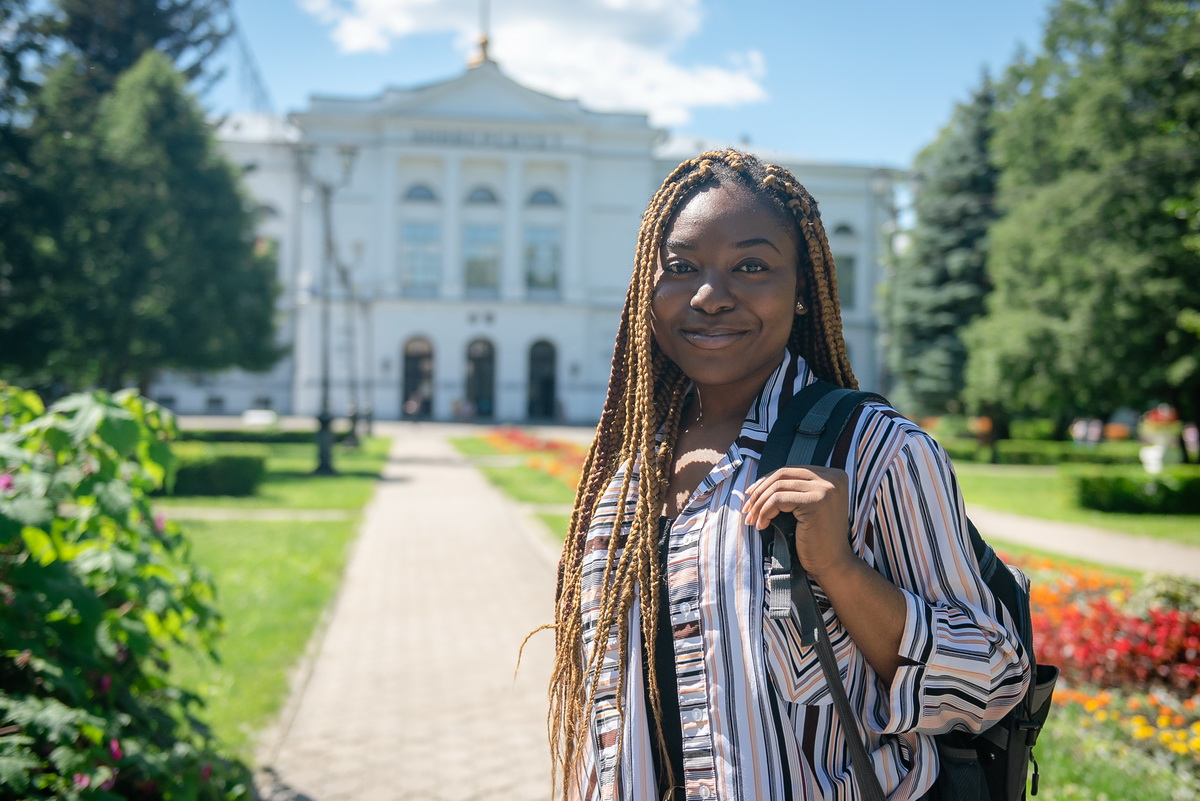TSU Faculty of Philology graduate Akor Gift Ojonoka defended her bachelor’s thesis “Communication in Russian and Nigerian Political Discourse: Typical Situations and Their verbalization”. The Exam Committee awarded the work the highest mark. The thesis was written in Russian; Gift says that to master this language was her life’s dream for a long time.
Akor Gift Ojonoka entered TSU in 2019, after receiving her bachelor’s degree in Nigeria. At the university, she studied Russian among other disciplines, but her work after university was not connected to the Russian language, and she started to lose her skills. To practice language she decided to get a master’s degree at one of the Russian universities and found the international olympiada Open Doors: Russian Scholarship Project, of which TSU is one of the organizers. The winners have the right to enter Russian universities and study there free of charge.
“I was choosing between three universities: Higher School of Economics in Moscow, South Ural State University, and TSU. I did not want to go to Moscow – the life there is too much like what we have in Nigeria. I wanted a quiet, peaceful city. I read up online on TSU, saw that it has a high ranking, and chose it. My family was surprised that I did not choose the capital city, but when I explained my decision, they let me go,” says Gift.

Gift’s scientific adviser was Valeria Kashpur, Assistant Professor at the Department of Romance and Germanic Philology.
“Gift was very comfortable to work with. She improved a lot during her two years of Master’s degree study. During her first year, we were discussing her future thesis in English but switched to Russian in the second year. She is motivated, responsible, clever, and intelligent,” notes Prof. Kashpur.
Valeria also notes that the topic of the thesis is very relevant: it has not been studied before, and it is rare to see Nigeria discussed in the philological community. The study focuses on typical communicative situations verbalized in speeches of Nigerian and Russian presidents.
There are three communicative situations present when the president addresses his compatriots: greetings, acknowledgments, farewells. To study it, Gift had analyzed 50 speeches of Vladimir Putin published on the Kremlin’s official website, and 50 speeches of Muhammadu Buhari taken from open sources.
“Turns out our President often uses the phrase ‘dear friends’. It emphasizes that he is close with the citizens. The President of Nigeria would never say that. He says ‘dear Nigerians’ twice in the material we analyzed – when the election results were announced. He mostly says ‘dear citizens’. Gift interpreted this as a personal quality. Buhari is a former war dictator turned president, everyone needs to comply with what he says. For Putin his electoral base is like his close relatives,” Valeria Kashpur drew an example.
It was also noted that Putin does not usually mention God, while Buhari ends every speech with “God bless Nigeria”.
“Gift’s excellent thesis is her own merit and that of the Faculty of Philology with its program Russian as a Foreign Language,” says Artyom Rykun, TSU Vice-Rector for International Affairs. “The Faculty of Philology is doing a good job, and their graduates achieve amazing results. We have recently found out that Ju Chuanya, who earned her doctoral degree at TSU, received a position at one of the strongest universities of China, Sun Yat-sen University. It is an outstanding achievement, one of many for the Faculty of Philology.”
Akor Gift Ojonoka plans to return to Nigeria, continue to teach English to Russian speakers, and continue learning Russian herself. Long-term plans include teaching Russian to Nigerians, perhaps at some university. Another long-term goal is to work for the UN.
Gift is the first TSU master’s student from Nigeria.
“Nigeria is a very interesting country. It has the highest GNP among African countries. The University of Nigeria was among the first in Africa to enter the QS University Ranking. Nigeria doubled in population over a short period of time - now it has about 200 million people. TSU consistently has a few students from Nigeria, and they have great communication skills, excellent English. This country has a lot of potential and Nigerian students bring this potential to TSU,” Artyom Rykun concluded.

